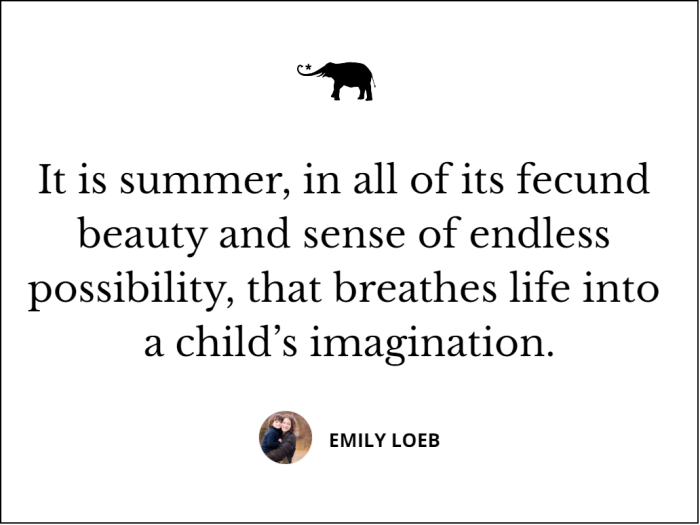Now that summer has come and gone, it’s a nice time to reflect on its magic, and how it comes through for us, year after year. This is especially true when we are young, as our favorite childhood memories are often made during the summer. (Consider: do any of your treasured memories involve heavy winter coats, clunky snow-boots or freezing in the snow waiting for the school bus? I would wager that for most of us, our best life moments didn’t occur in the God-forsaken months of January and February, when it’s bitter cold outside and there are no significant holidays in sight.)
It is summer, in all of its fecund beauty and sense of endless possibility, that breathes life into a child’s imagination. Summer means space, room to explore, a time to discover things about ourselves and others, and for many of us, summer is forever associated with going to camp.
School means harsh overhead lighting, drab colors and sitting in an uncomfortable chair for hours on end—basically, an assault on childhood senses. Camp, both day and sleepaway, is the refreshing, invigorating antidote. It means open, blue skies, outdoor spaces (children need space to grow), and a delicious feeling of freedom. It’s a slow, deep exhale; one that untangles the knots in the belly put there by evil classmates and endless amounts of homework.
The camp day is structured around fun—it is the number one priority, making it more conducive for kids to let their guard down and discover their best qualities. It is where kids have the chance to (consciously or subconsciously), decide if they want to change the narrative of their childhood. The people who like to tell them who they are during the school year aren’t around, making it easier to figure out for themselves who they want to be. It’s also where kids can naturally discover what their learning style is. During my camp days, I realized I was a visual learner; I remember making this connection while I watched my friends play sports and I was able to understand the games in a much more organic way than when the rules were simply explained to me.
The day camp my children have been attending for the past decade has been around for over 100 years. It’s easy to imagine campers from different eras strolling through its grounds, day after day, feeling a sense of ease while becoming more and more themselves. It’s where, unknowingly, they become a part of each other’s stories, the ones they tell for the rest of their lives. “Oh, yeah, I went to camp when I was a kid,” they respond when asked. “I had my first kiss with Rebecca Goldstein behind the nature cabin when I was 11.” (Rebecca Goldstein, wherever you are, cheers to you.)
***************
Camp is like its own living organism. It has a particular vernacular: songs (about camp), groups names, monikers for its buildings/cabins, as well as the (sometimes life-long) nicknames bestowed upon younger campers from older ones. Overhead conversations can include random musings about Jupiter, questions about how ice cream is made, or ponderings on the origins of Wonder Woman. It is an unspoken rule that most conversations don’t require official beginnings or endings, another delightful departure from school.
Camp has its own wardrobe—easy and breezy—clothes that feel weightless, like tank tops with band logos and long shorts (all of which tend to end up in a dirty heap at the bottom of a camp bag mixed in with gum wrappers and sand.) Damp towels are draped around necks, while hair dries in stiff, chlorinated clumps down the back. Tattered, scoffed lanyard bracelets (made at arts and crafts during the second week) are a common accessory, along with beaded, lettered bracelets replete with secret friendship codes. Sometimes, it becomes necessary to borrow a t-shirt, and it smells of sunscreen and the unfamiliar scent of other people’s laundry detergent. This becomes a stark reminder that fellow campers have lives away from camp, lives where someone does their laundry, and this can seem impossible to reconcile with their current mutual reality as campers.
Then there is the universal, signature scent of camp: that ineffable mixture of sweat, bug spray and cookouts. For the rest of their lives, when former campers get so much as a tiny whiff of that smell, it brings about a specific lump of aching nostalgia to their throat.
The summer I was 12, my favorite counselor was Andrea. She smelled of Love’s Baby Soft, Noxzema, and teenage-girl coolness. Ohh…teenage counselors! Those mysterious, mythical creatures! Getting to be around them is one of the best parts of being a camper, and Andrea was the ultimate. She was nice to everyone, always participated in our activities (even the ones she didn’t like), and she had a deep, throaty laugh similar to Demi Moore, who we all wanted to be that summer. Andrea had the silkiest, most beautiful hair I had ever seen; I can still picture her standing in the locker room, hair tie between her teeth, flipping her head so she could gather her hair into her hands and transform it into an elegant swoop of a bun/ponytail on the top of her head.
I was fascinated by her—by her beauty and kindness—but also because at 19, she was still a teenager, therefore slightly accessible, but old enough to be out of reach—perfect for idolization. She had a boyfriend named Billy, and he would pick her up every day after camp and they would ride their bicycles home together. It was the first time I had witnessed people in love the way they were in love, like they had a little white light around them all the time. Whenever one of them spoke, even if they were addressing a group of people, their eyes were always locked in on each other and you could feel an electric current.
I had an instant, burning crush on Billy; I would make up elaborate fantasies about the two of us (in order to let myself fantasize about him though, first I would have to make up a story in my head about he and Andrea amicably splitting because she had moved to Paris to study at the Sorbonne—something I knew she wanted to do at some point—so of course, even though it was difficult, they decided to break up. They were still really good friends.) When I rode my bike around my neighborhood, I would pretend he was riding next to me, and we would have the most amazing conversations and laugh and laugh. Every once in a while, I would catch him staring at me with the same loving gaze he bestowed upon Andrea, and I would actually blush. To this day, whenever I hear the name Billy or Bill or even mention of the Bill of Rights or bills that have to get paid, my stomach dips and drops in his memory.
****************
At my children’s camp (where I worked part-time this past summer), one its main buildings has an old staircase which connects the rec hall to the cafeteria. The staircase contains 17 steps, each one painted a different color. The paint is fading and the stairs sag a bit towards the middle, where people tend to stride. It’s easy to look and simply see a staircase, but if you close your eyes and listen, you can feel its stories. The thousands of feet it has supported. Feet that started off wearing small sneakers, which grew bigger and bigger, growing from big-kid to teenage size. These invisible footprints represent not just the physical growth of the campers, but their emotional and psychological development as well.
The staircase contains story after story of friendship, trust, bravery, as well as the other triumphs and losses that are part of growing up—the intensity of first love, the hot pain of an unrequited crush. They hold the stories of kids as they found their people, feeling part of a community (some for the first time), of the friends who hold us up and keep us coming back…our favorite childhood memories.
It also holds the tears from the dreaded last day of camp, the one where campers mourn not just the end of summer, but the loss of their favorite version of themselves. “I’ll see you next summer,” everyone says, in that way you do when you’re young and you can’t imagine anything ever changing. Fortunately, camp is the one variable that doesn’t change, even when its attendees sometimes do. For the ones who are lucky enough to return, year after year, the summer skin they create and wear at camp is always waiting for them. It patiently rides out the school year, and although it may fit tighter from previous summers, once it’s broken into, it always ends up fitting just right.







Read 1 comment and reply